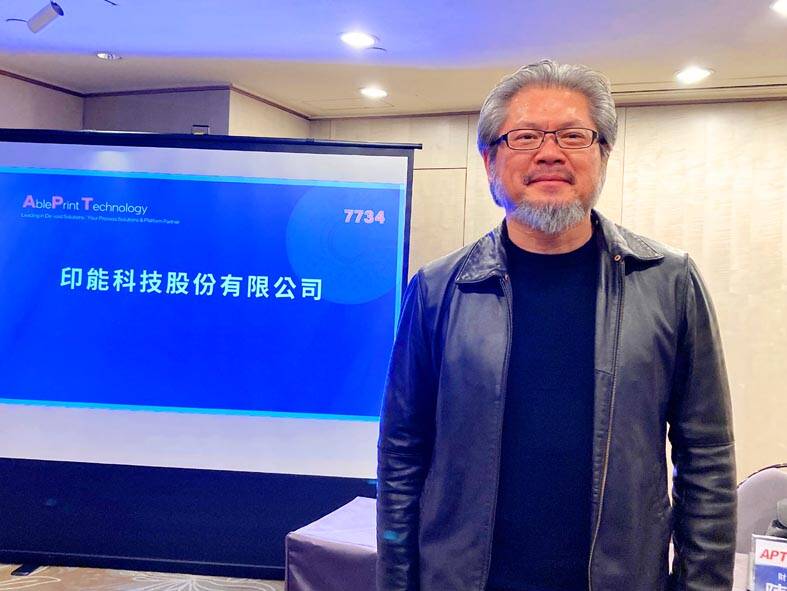AblePrint Technology Co (APT, 印能科技) yesterday said it expects strong revenue growth this year due to robust demand for advanced packaging for artificial intelligence (AI) and high-performance computing chips.
AI applications helped prop up APT’s revenue in the second half of last year thanks to rising demand for advanced chip packaging technologies, including chip-on-wafer-on-substrate, or CoWoS, fanout packaging and panel-level packaging, the Hsinchu-based firm said.
That compares with a slump in the first half of last year, when most semiconductor companies suffered from an inventory-driven correction, it said.

Photo: Grace Hung, Taipei Times
In the first two months of this year, revenue increased 88.13 percent year-on-year to NT$218 million (US$6.93 million), company data showed.
APT supplies burn-in ovens and related technologies to address major issues faced by customers in the manufacturing processes — from void eliminations to void-free soldering and package warpage suppression.
The company counts Taiwan Semiconductor Manufacturing Co (TSMC, 台積電) and the world’s leading chip packagers among its customers.
“As our customers are growing, we will be growing, too,” APT chairman Auger Horng (洪誌宏) told a media briefing in Taipei.
APT wants to “wow” investors with substantial revenue growth this year, Horng said, implying that growth could be as high as 50 percent from a year earlier.
The company has a good order visibility of six months this year, he said.
China and North America are the two markets with the greatest growth potential, he added.
APT reported a 30 percent annual decline in revenue last year to NT$1.19 billion.
Taiwan, China, Japan, South Korea and Malaysia accounted for 70 percent of the company’s revenue last year, it said.
Net profit last year plummeted 29 percent to NT$549 million from NT$776 million a year earlier.
Gross margin improved to 66.3 percent from 65.8 percent.
In light of the growing AI business, APT plans to set up a sales office in the US, as customers are building new chip packaging factories in the US and Mexico, the company said.
North America leads global demand for AI chips, it said.
APT is to start trading on the Emerging Stock Board today at NT$489 per share.

United Microelectronics Corp (UMC, 聯電) expects its addressable market to grow by a low single-digit percentage this year, lower than the overall foundry industry’s 15 percent expansion and the global semiconductor industry’s 10 percent growth, the contract chipmaker said yesterday after reporting the worst profit in four-and-a-half years in the fourth quarter of last year. Growth would be fueled by demand for artificial intelligence (AI) servers, a moderate recovery in consumer electronics and an increase in semiconductor content, UMC said. “UMC’s goal is to outgrow our addressable market while maintaining our structural profitability,” UMC copresident Jason Wang (王石) told an online earnings

The US Federal Reserve is expected to announce a pause in rate cuts on Wednesday, as policymakers look to continue tackling inflation under close and vocal scrutiny from US President Donald Trump. The Fed cut its key lending rate by a full percentage point in the final four months of last year and indicated it would move more cautiously going forward amid an uptick in inflation away from its long-term target of 2 percent. “I think they will do nothing, and I think they should do nothing,” Federal Reserve Bank of St Louis former president Jim Bullard said. “I think the

The TAIEX ended the Year of the Dragon yesterday up about 30 percent, led by contract chipmaker Taiwan Semiconductor Manufacturing Co (TSMC, 台積電). The benchmark index closed up 225.40 points, or 0.97 percent, at 23,525.41 on the last trading session of the Year of the Dragon before the Lunar New Year holiday ushers in the Year of the Snake. During the Year of the Dragon, the TAIEX rose 5,429.34 points, the highest ever, while the 30 percent increase in the year was the second-highest behind only a 30.84 percent gain in the Year of the Rat from Jan. 25, 2020, to Feb.

Cryptocurrencies gave a lukewarm reception to US President Donald Trump’s first policy moves on digital assets, notching small gains after he commissioned a report on regulation and a crypto reserve. Bitcoin has been broadly steady since Trump took office on Monday and was trading at about US$105,000 yesterday as some of the euphoria around a hoped-for revolution in cryptocurrency regulation ebbed. Smaller cryptocurrency ether has likewise had a fairly steady week, although was up 5 percent in the Asia day to US$3,420. Bitcoin had been one of the most spectacular “Trump trades” in financial markets, gaining 50 percent to break above US$100,000 and